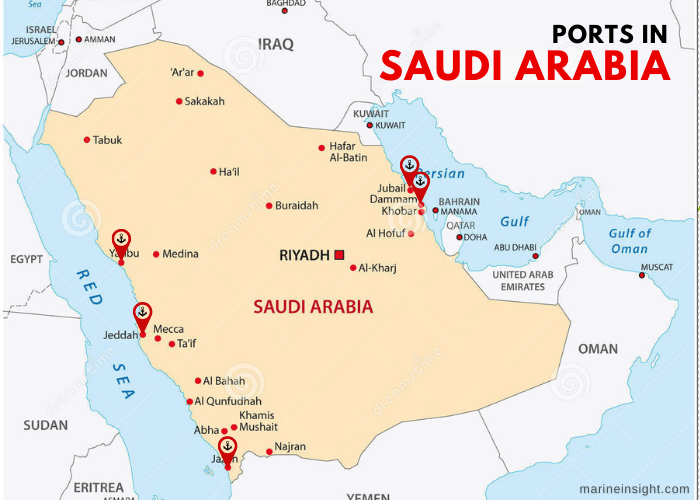Situated in Western Asia on the Arabian Peninsula, the Kingdom of Saudi Arabia boasts the 19th largest economy globally, primarily driven by its petroleum and oil exports. With abundant natural gas reserves and mineral deposits, it engages in trade with several countries, including China, the US, and India, among others. Its agricultural sector yields export-quality produce, while a diverse industrial base supports economic growth.
Bordering the Red Sea to the west and the Persian Gulf to the east, Saudi Arabia has invested significantly in developing its international port facilities, totaling around 20 ports and terminals. Among these, the Jeddah and Dammam Ports stand out as the busiest.

Previously managed by various agencies, Saudi Arabia established an Independent Ports Authority in 1977 to oversee port operations, which were subsequently privatized. Here’s an overview of the seven major ports in the country:
Jeddah Islamic Port:
Located on the Red Sea coast, Jeddah Port serves as a crucial gateway for trade, especially for the holy cities of Mecca and Medina. As the commercial capital of Saudi Arabia, it holds strategic importance, facilitating trade between Africa and the Middle East. With a history dating back to 645 AD, the port underwent modernization starting in 1976. It covers 12.5 square kilometers, with 62 berths across four terminal facilities, handling various goods, including containers, livestock, and petroleum.
King Abdul Aziz Port
Dammam Port:
Situated in Dammam on the Persian Gulf, this port is pivotal for the region’s oil and natural gas industry, serving as a key entry point for goods destined for central and eastern Saudi Arabia. Established under King Abdulaziz bin Abdulrahman Al Saud’s directives, it covers extensive land area, including facilities for containerized cargo, automobiles, and construction materials. Operated by International Port Services, it features specialized terminals for different types of cargo.
King Fahad Industrial Port in Yanbu:
Located on the Red Sea coast, this port specializes in crude and refined petroleum, petrochemicals, and industrial products. Its strategic location near major shipping routes enhances its significance for global trade. With modern terminals and extensive storage facilities, it plays a crucial role in supporting industrial complexes and facilitating trade.
Yanbu Commercial Port:
Constructed adjacent to Saudi Arabia’s oldest port, Yanbu Commercial Port serves as a subsidiary of the King Fahad Industrial Port. It features modern facilities for handling various cargo types, including a passenger terminal and grain storage silos.
Jubail Commercial Port:
Situated on the Arabian Gulf coast, Jubail Port is one of the world’s largest artificial harbors, supporting the Kingdom’s industrial and petrochemical complex. With multiple terminals for different cargo types, it enhances the country’s trade competitiveness.
King Fahad Industrial Port, Jubail:
Part of the Jubail Commercial Port, this facility specializes in handling raw materials for local industries and shipping petrochemical products globally. Its strategic location near the Jubail industrial city reduces congestion at other ports.
Port of Jazan – Jizan:
Located on the eastern coast near the Yemeni border, Jazan Port serves the southern part of Saudi Arabia, particularly for livestock imports from Africa. Expanded over several stages, it features multiple berths and facilities for handling various cargo types.
These ports collectively play a vital role in Saudi Arabia’s economy, facilitating trade and supporting industrial growth.


Latest Products
8-inch Color TFT LCD GPS Chart Plotter with EchoSounder, AIS Transponder, and Radar MFD (5-in-1)
8-inch GPS Chart Plotter with AIS and Radar
Onwa KM-8A (BUNDLE) 8-inch Color TFT LCD GPS Chart Plotter with Class B+ AIS Transponder MFD [BUNDLE]
Onwa KM-8C 8-inch Color TFT LCD GPS Chart Plotter with EchoSounder MFD